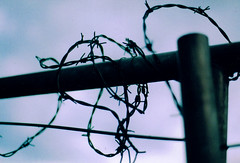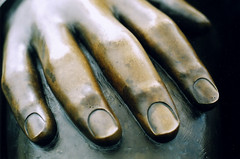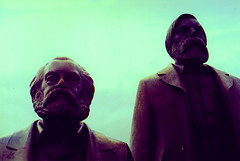Yesterday I spent most of the day reading Andrea Dworkin's
Letters from a War Zone: Writings 1976-1987. Andrea Dworkin was a Jewish-American radical feminist, who died this past year at the age of 58. For her anti-pornography stance and her uncompromising analysis of the violence of the sex/gender system, Dworkin was perhaps the most maligned feminist thinker of her generation, and - in my view - one of its best rhetoriticians.
Letters from a War Zone is a collection of her speeches, articles, interviews, and reflections from that period. It includes "I Want a Twenty-Four-Hour Truce During Which There Is No Rape", which is a speech Dworkin gave in 1983 at the Midwest Regional Conference of the National Organization for Changing Men, in Minnesota, to an audience of about 500 men and a few women. This is how the speech ends:
"I want one day of respite, one day off, one day in which no new bodies are piled up, one day in which no new agony is added to the old, and I am asking you to give it to me. And how could I ask you for less -- it is so little. And how could you offer me less: it is so little. Even in wars, there are days of truce. Go and organize a truce. Stop your side for one day. I want a twenty-four-hour truce during which there is no rape...And on that day, that day of truce, that day when not one woman is raped, we will begin the real practice of equality, because we can't begin it before that day. Before that day it means nothing, because it is nothing: it is not real; it is not true. But on that day it becomes real. And then, instead of rape we will for the first time in our lives -- both men and women -- begin to experience freedom...If you have a conception of freedom that includes the existence of rape, you are wrong. For myself, I want to experience just one day of real freedom before I die. I leave you here to do that for me and for the women whom you say you love."
Dworkin's feminism was premised on an analysis of women's oppression according to which the endemic violence against women perpetrated by men (and its cultural representation, i.e., pornography) is constitutive of gender as such. In "Feminism: An Agenda" (also anthologized in
Letters from a War Zone), Dworkin writes that "women's fundamental condition is defined literally by the lack of physical integrity of our bodies...our subordinate place in society begins there." Women are
made into women by the institutionally-endorsed, multifarious assaults on their bodies, both actual and potential. One in three American or Canadian women will be sexually assaulted in her lifetime, most probably between the ages of 16 and 18. The prevalence of violence against women in this society structures most aspects of women's existence: it truncates women's freedom of movement and self-expression; it affects the nature of their sexual and familial relationships, their relations to other women, their relations to strangers, the street, and public space; it deeply informs their psychosomatic experience and their dreams and constructions of what is "possible"...
But what struck me most reading Dworkin this time around was the fact that her feminism is also premised on a real optimism about the possibility of transformation. Her description of the conditions structuring women's lives is dismal, to be sure, and this -- along with her demand that men change their practices -- is likely what accounts for her vilification in anti-feminist and feminist circles. She's been accused of perpetuating a view of women as victims, a "victim feminism" which divests women of agency. But this criticism, I think, is misled. It's like calling Marxism a "victimology" for having an accurate, empirically adequate analysis of class exploitation. In other words, this criticism conflates the naming of the problem (e.g., oppression, class exploitation) with the cause of the problem (misogyny, or private property) Both by anti-feminists and by feminists, Dworkin is most frequently characterized as a "negative", anti-sex, man-hating biological determinist: but
Letters from a War Zone controverts that caricature. Not only is her writing polemically optimistic, but -- and I found this surprising, rereading her -- Dworkin's feminism is ultimately about love; her praxis is about the transformation of oppressive social relations which preclude the possibility of love. Nearly all of Dworkin's speeches -- as I discovered reading
Letters from a War Zone -- end with the insistence that the feminist struggle is really about love, about realizing a world in which love is truly possible.
Recently the mother of a friend of mine was murdered by her ex-boyfriend, at whose hands she suffered a great deal. The vast majority of women who are battered, sexually assaulted, raped, and tortured, are thus treated by men who are known and close to them, and these assaults most often occur in their homes. The domestic space is a domesticating space for millions of women (both those who are actually violated between its walls, and those for whom this is a looming threat). This violence has a social function: to keep women down. This is why I was infuriated when, at this murdered woman's funeral, no mention was made of how she died or how she struggled. Not a word was said about the millions of women who lead similar lives, who die similar deaths. And this public silence privatizes the social problem of gendered violence: it isolates women in their inhospitable homes. It forecloses the possibility of survival and it murders the possibility of a world in which love is a possibility.
Turning to Dworkin helps me to understand this woman's death -- and the many deaths of the spirit that surround such literal deaths -- as a political problem, and not as the result of the random actions of an individual. Perhaps one of Dworkin's most challenging insights is that ordinary men commit these violations; that, indeed, violating women is normative for ordinary masculinity. Men who murder women aren't psychopaths, on Dworkin's view: they belong on a continuum of normative masculinity, defined by the eroticized impulse to dominate women. Dworkin's feminism illuminates this woman's death as no mere tragic "accident", but as a symptom of fundamental, and wholly contingent, power relations. And this is useful, because it mobilizes the anger I feel at this woman's death, toward taking collective action. WIthout such analysis, such "accidents" as her death, would be, in a sense, inevitable: because accidents "just happen," there is no transformative struggle possible against them. But this woman's death, I want to repeat, is no accident. And action is not only possible, it is needed, it is
necessary, for
"it is not enough to cry 'Enough.' We must use our bodies to say 'Enough' -- we must form a barricade with our bodies , but the barricade must move as the ocean moves and be formidable as the ocean is formidable. We must use our collective strength and passion and endurance to take back this
night and every night so that life will be worth living and so that human dignity will be a reality. What we do here tonight is that simple, that difficult, and that important."
-- In memory of B.K. and Andrea Dworkin.













